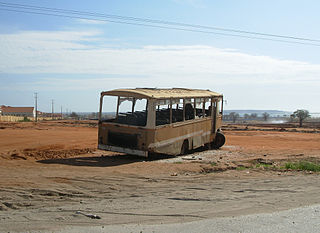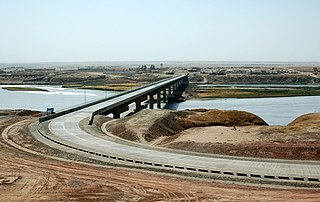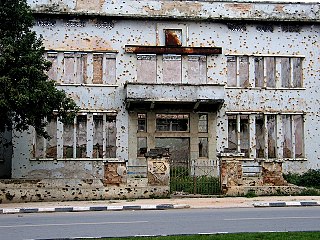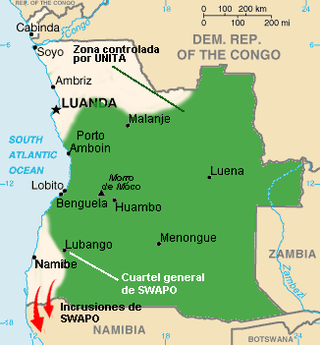The United Nations Mission of Observers in Tajikistan (UNMOT) was a peacekeeping mission established by the United Nations Security Council in December 1994, and its mandate expired in May 2000. Its purpose was to monitor peace agreements during and after the Tajikistan Civil War. The observers were first deployed in the wake of the ceasefire, in 1994, between the ruling government of Tajikistan, led by Emomali Rahmonov, and the United Tajik Opposition. After the UN-sponsored armistice ended the war in 1997, the UN expanded the mission's original mandate to monitor the peace and demobilization. The mission was headquartered in Dushanbe, Tajikistan.
United Nations Security Council resolution 932, adopted unanimously on 30 June 1994, after reaffirming Resolution 696 (1991) and all subsequent resolutions on Angola, the council discussed the situation during the civil war and extended the mandate of the United Nations Angola Verification Mission II until 30 September 1994.

United Nations Security Council resolution 945, adopted unanimously on 29 September 1994, after reaffirming Resolution 696 (1991) and all subsequent resolutions on Angola, the Council extended the mandate of the United Nations Angola Verification Mission II until 31 October 1994 and discussed the implementation of peace agreements.

United Nations Security Council resolution 952, adopted unanimously on 27 October 1994, after reaffirming Resolution 696 (1991) and all subsequent resolutions on Angola, the Council discussed the implementation of a ceasefire in the country and extended the mandate of the United Nations Angola Verification Mission II until 8 December 1994.

United Nations Security Council resolution 968, adopted unanimously on 16 December 1994, after noting statements by the president of the security council and reports by the Secretary-General Boutros Boutros-Ghali on the situation in Tajikistan, the council established the United Nations Mission of Observers in Tajikistan (UNMOT) and addressed the process of national reconciliation in the country.

United Nations Security Council resolution 999, adopted unanimously on 16 June 1995, after recalling Resolution 968 (1994) on the situation in Tajikistan, the Council extended the mandate of the United Nations Mission of Observers in Tajikistan (UNMOT) until 15 December 1995 and addressed the process of national reconciliation in the country.

United Nations Security Council resolution 1030, adopted unanimously on 14 December 1995, after recalling previous resolutions 968 (1994) and 999 (1995) on the situation in Tajikistan, the Council extended the mandate of the United Nations Mission of Observers in Tajikistan (UNMOT) until 15 June 1996 and addressed the process of national reconciliation in the country.

United Nations Security Council resolution 1061, adopted unanimously on 14 June 1996, after recalling all resolutions on the situation in Tajikistan and the Tajik-Afghan border, the Council extended the mandate of the United Nations Mission of Observers in Tajikistan (UNMOT) until 15 December 1996 and addressed efforts to end the conflict in the country.

United Nations Security Council resolution 1089, adopted unanimously on 13 December 1996, after recalling all resolutions on the situation in Tajikistan and the Tajik-Afghan border, the Council extended the mandate of the United Nations Mission of Observers in Tajikistan (UNMOT) until 15 March 1997 and addressed efforts to end the conflict in the country.

United Nations Security Council resolution 1099, adopted unanimously on 14 March 1997, after recalling all resolutions on the situation in Tajikistan and the Tajik-Afghan border, the Council extended the mandate of the United Nations Mission of Observers in Tajikistan (UNMOT) until 15 June 1997 and addressed efforts to end the conflict in the country.

United Nations Security Council resolution 1128, adopted unanimously on 12 September 1997, after recalling all resolutions on the situation in Tajikistan and along the Tajik-Afghan border, the Council extended the mandate of the United Nations Mission of Observers in Tajikistan (UNMOT) for a period of two months until 15 November 1997.

United Nations Security Council resolution 1138, adopted unanimously on 14 November 1997, after recalling all resolutions on the situation in Tajikistan and along the Tajik-Afghan border, the Council expanded and extended the mandate of the United Nations Mission of Observers in Tajikistan (UNMOT) until 15 May 1998.

United Nations Security Council resolution 1167, adopted unanimously on 14 May 1998, after recalling all resolutions on the situation in Tajikistan and along the Tajik-Afghan border, the Council extended the mandate of the United Nations Mission of Observers in Tajikistan (UNMOT) for a further six months until 15 November 1998.

United Nations Security Council resolution 1180, adopted unanimously on 29 June 1998, after reaffirming Resolution 696 (1991) and all subsequent resolutions on Angola, particularly resolutions 1173 (1998) and 1176 (1998), the Council extended the mandate of the United Nations Observer Mission in Angola (MONUA) until 15 August 1998.

United Nations Security Council resolution 1190, adopted unanimously on 13 August 1998, after reaffirming Resolution 696 (1991) and all subsequent resolutions on Angola, particularly resolutions 864 (1993), 1127 (1997) and 1173 (1998), the Council extended the mandate of the United Nations Observer Mission in Angola (MONUA) until 15 September 1998.

United Nations Security Council resolution 1206, adopted unanimously on 12 November 1998, after recalling all resolutions on the situation in Tajikistan and along the Tajik-Afghan border, the Council extended the mandate of the United Nations Mission of Observers in Tajikistan (UNMOT) for a further six months until 15 May 1999.

United Nations Security Council resolution 1213, adopted unanimously on 3 December 1998, after reaffirming Resolution 696 (1991) and all subsequent resolutions on Angola, including resolutions 846 (1993), 1127 (1997) and 1173 (1998), the Council extended the mandate of the United Nations Observer Mission in Angola (MONUA) for a final time until 26 February 1999.
United Nations Security Council resolution 1240, adopted unanimously on 15 May 1999, after recalling all resolutions on the situation in Tajikistan and along the Tajik-Afghan border, the Council extended the mandate of the United Nations Mission of Observers in Tajikistan (UNMOT) for a further six months until 15 November 1999.

United Nations Security Council resolution 1274, adopted unanimously on 12 November 1999, after recalling all resolutions on the situation in Tajikistan and along the Tajik-Afghan border, the Council extended the mandate of the United Nations Mission of Observers in Tajikistan (UNMOT) for a further six months until 15 May 2000 and addressed preparations for upcoming parliamentary elections in the country.

United Nations Security Council resolution 1622, adopted unanimously on 13 September 2005, after reaffirming all resolutions on the situation between Eritrea and Ethiopia, particularly Resolution 1586 (2005), the Council extended the mandate of the United Nations Mission in Ethiopia and Eritrea (UNMEE) until 15 March 2006.















